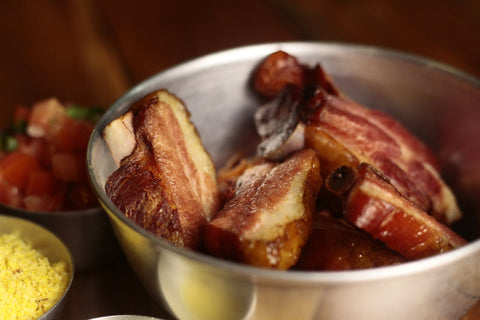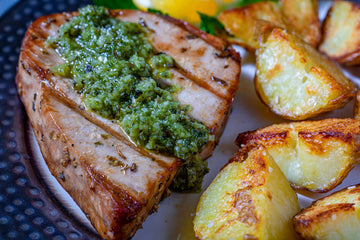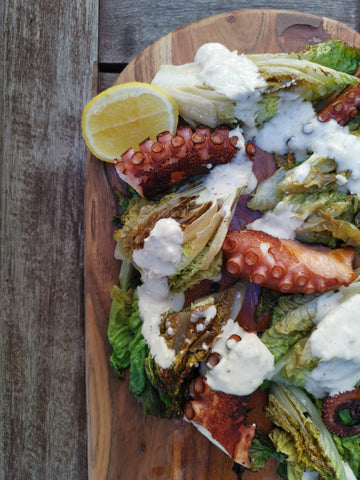
Iberico pork, known for its rich flavor and succulent texture, is a true standout in the culinary world. This Spanish delicacy, sourced from the prized Iberian pig, boasts a marbling and depth of taste unlike any other pork. Chefs and food enthusiasts seek to elevate Iberico pork through thoughtful and well-balanced pairings that enhance its natural characteristics. We'll explore pairing Iberico pork with complementary flavors to create a gourmet dining experience. Whether you're an experienced chef or a home cook, understanding these pairings can help you bring out the best in this premium meat.
Understanding the Unique Qualities of Iberico Pork
Before diving into the perfect pairings, it's essential to understand why Iberico pork is such a coveted ingredient. Unlike conventional pork, Iberico pork is sourced from the black Iberian pigs native to Spain. These pigs are often allowed to roam freely, feeding on a diet of acorns, herbs, and grasses, which gives the pork its distinctive flavor and marbling.
Iberico pork's high-fat content and marbling make it incredibly tender and flavorful. The meat has a deep, savory taste with subtle nutty notes, mainly due to the pigs' acorn diet. This combination of texture and taste calls for careful pairing, as the wrong ingredients can easily overwhelm the pork's delicate flavors.
Why Flavor Pairing Matters
Pairing Iberico pork with the right flavors enhances the natural qualities of the meat rather than overshadowing it. Complementation ingredients can bring out its depth, provide balance, and introduce new dimensions when adequately matched. Below, we explore flavor profiles, ingredients, and culinary techniques that can best complement Iberico pork in various settings.
Best Flavors to Pair with Iberico Pork
1. Herbs and Spices
Herbs and spices can naturally enhance the taste of Iberico pork without overpowering it. Light, earthy herbs and warming spices work well with its rich profile.
Rosemary and Thyme: These herbs have woody, aromatic qualities that complement Iberico pork's savory and slightly nutty flavor. When used in marinades or as a finishing garnish, rosemary and thyme help to elevate the pork's complexity.Smoked Paprika: Common in Spanish cuisine, smoked paprika adds a subtle smoky depth that enhances the natural flavors of Iberico pork. Its warmth blends harmoniously with the meat's sweetness.
Garlic: Garlic is a versatile ingredient that works well with Iberico pork, especially when roasted or slow-cooked. The rich, caramelized notes of garlic mirror the pork's depth, creating a balance between savory and sweet.
2. Acidic and Sweet Ingredients
Acidity and sweetness can create contrast, brightening the dish and cutting through the richness of Iberico pork. The key is to maintain balance so that the pork remains the star.
Citrus (Lemon, Orange, Grapefruit): A hint of citrus zest or juice adds brightness to a pork dish, balancing its fattiness. Orange, in particular, complements the nutty undertones of Iberico pork, while lemon can add a zesty freshness.Apples and Pears: Iberico pork pairs wonderfully with fruits that offer sweetness without being too overpowering. Apples, when sautéed or roasted, introduce a natural sweetness that plays well against the savory richness of the pork. When poached or caramelized, Pears provide a similar effect, adding complexity to the dish.
Balsamic Vinegar: The tangy and slightly sweet profile of balsamic vinegar complements the fat content of Iberico pork. Drizzled over the meat, a balsamic reduction can elevate the flavors without overwhelming the palate.
3. Umami and Savory Elements
Umami-rich ingredients can deepen the natural flavors of Iberico pork while creating a more layered eating experience.
Mushrooms: Earthy mushrooms like porcini, shiitake, or oyster complement Iberico pork. Their umami profile enhances the pork's savoriness; when sautéed or roasted, they add a textural contrast that enriches the dish.Soy Sauce: While not a traditional ingredient in Spanish cuisine, soy sauce's umami and saltiness can be used in moderation to add depth. A light soy-based marinade can help accentuate the savory flavors of Iberico pork.
Anchovies: Small amounts of anchovies, used sparingly in sauces or dressings, can amplify the richness of Iberico pork by introducing a subtle saltiness that complements its fatty texture.
Cooking Techniques that Enhance Iberico Pork's Flavor
Beyond choosing complementary ingredients, how Iberico pork is prepared plays a significant role in how its flavors are presented. Let's explore some techniques that best highlight its qualities.
1. Grilling
Grilling Iberico pork adds a smoky depth to the meat, while the high heat helps to render the fat, giving it a crispy outer layer. When grilling, it's best to season the pork with simple ingredients like salt, pepper, and herbs to allow the natural flavor the chance to shine through.
2. Slow Roasting
Slow roasting allows the fat within the pork to melt gradually, keeping the meat tender and juicy. This technique works especially well when paired with hearty vegetables like potatoes or carrots, which absorb the pork's flavorful fat.
3. Pan-Seared
For quicker preparation, pan-searing Iberico pork creates a deliciously caramelized crust while maintaining the juiciness inside. A cast-iron skillet is perfect for this method, and adding butter and herbs towards the end of cooking can introduce extra layers of flavor.
Complementary Side Dishes
Pairing Iberico pork with suitable side dishes is another way to create a balanced meal. While the pork itself is rich and flavorful, sides can offer contrast and texture that complete the dish.
1. Roasted Vegetables
Root vegetables such as carrots, parsnips, and potatoes work well with Iberico pork due to their earthy, slightly sweet profiles. Roasting these vegetables alongside the pork allows them to soak up some of the flavorful fat, creating a cohesive dish.
2. Creamy Polenta or Risotto
Creamy grains like polenta or risotto provide a smooth, rich base that complements the texture of Iberico pork. Polenta's mild flavor makes the pork stand out, while a mushroom risotto adds umami depth to the meal.
3. Sautéed Greens
Leafy greens like spinach, kale, or Swiss chard sautéed with garlic and olive oil introduce a bitter and slightly acidic contrast to the fatty richness of the pork. This balance helps cut through the pork's heaviness, making the meal feel lighter.
Perfect Wines to Pair with Iberico Pork
Pairing Iberico pork with the right wine further enhances the dining experience. The richness of the pork calls for wines that can stand up to its flavor without overpowering it.
1. Rioja
A medium to full-bodied red wine like Rioja pairs beautifully with Iberico pork. Its tannic structure and fruity notes complement the pork's richness, creating a balanced and harmonious pairing.
2. Tempranillo
Another Spanish wine, Tempranillo, offers a balance of fruitiness and acidity, making it an ideal match for Iberico pork's savory and slightly nutty flavors.
3. Pinot Noir
Pinot Noir's subtle fruit flavors and moderate acidity are perfect for those who prefer lighter red wine. It provides enough structure to balance the pork without overwhelming it.
Elevating Your Culinary Experience with Iberico Pork
Iberico pork is a versatile and flavorful cut of meat that can be elevated through thoughtful pairings. From herbs and spices to acidic fruits and umami-rich ingredients, the right combinations can transform your dish into a gourmet experience. Whether you grill, roast, or pan-sear the pork, pairing it with the right sides and a complimentary wine will ensure a memorable meal. By understanding the unique qualities of Iberico pork and how to enhance them, you can bring out the best in this exceptional meat.
FAQ: Understanding and Pairing Iberico Pork
1. What is Iberico pork?
Iberico pork is a premium type of pork from the black Iberian pig, native to Spain. These pigs are often pasture-raised and fed a diet rich in acorns, giving the meat a unique flavor and exceptional marbling compared to traditional pork.
2. What makes Iberico pork different from regular pork?
The key differences are the diet of the pigs and the meat's high-fat content. Iberico pork has a richer, more complex flavor due to the pigs' acorn diet, and its marbled fat provides tenderness and juiciness, making it a gourmet meat compared to conventional pork.
3. How do I pair Iberico pork with complementary flavors?
Iberico pork pairs well with earthy herbs like rosemary and thyme, sweet and acidic ingredients like apples, pears, and citrus, and umami-rich elements like mushrooms and soy sauce. These flavors enhance the natural richness of the pork without overpowering it.
4. What are the best cooking methods for Iberico pork?
Grilling, slow roasting, and pan-searing are the best ways to cook Iberico pork. These methods allow the fat to render properly, resulting in a flavorful and tender dish. Simplicity is key—season the pork lightly to let its natural flavors shine.
5. What side dishes pair well with Iberico pork?
Root vegetables like potatoes and carrots, creamy polenta, risotto, and sautéed greens are excellent side dishes for Iberico pork. These sides provide a balance of textures and flavors that add to the richness of the pork.
6. Which wines should I pair with Iberico pork?
Wines like Rioja, Tempranillo, and Pinot Noir pair well with Iberico pork. These wines offer enough acidity and structure to balance the pork's richness without overwhelming the dish.
7. Can I use Iberico pork in everyday cooking?
Yes, while Iberico pork is considered a gourmet product, it can be used in everyday cooking. Simple preparations like grilling or roasting, paired with everyday ingredients, can elevate your meals without being overly complex.
8. What fruits pair best with Iberico pork?
Fruits like apples, pears, and citrus (like oranges or lemons) pair beautifully with Iberico pork. The natural sweetness and acidity of these fruits balance the savory, rich flavors of the meat.
9. Is Iberico pork healthy?
Iberico pork is healthier than conventional pork due to its higher content of unsaturated fats, which come from the pigs' acorn-rich diet. This makes the meat flavorful and potentially heart-healthy when eaten in moderation.
10. What spices can I use with Iberico pork?
You can use spices like smoked paprika, garlic, and black pepper with Iberico pork. These spices enhance the savory elements of the pork without overpowering its natural, nutty flavor.
Oct 04 2024









